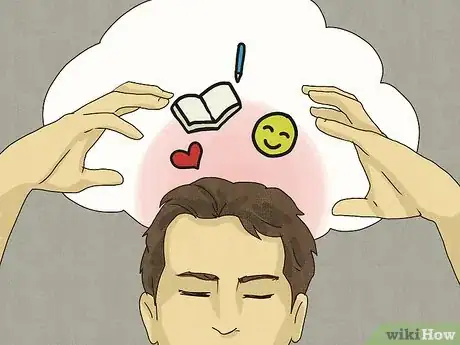This article was co-authored by Ashlyne Mullen, PsyD. Dr. Ashlyne Mullen is a Licensed Clinical Psychologist based in New York City. She specializes in helping people through chronic illness, anxiety, depression, grief, insomnia, personal growth, and relationships. Dr. Mullen holds a PsyD in Clinical Psychology, an MS in Applied Psychology, and an MA in Educational Psychology. She has extensive training in Acceptance and Commitment Therapy (ACT), Cognitive Behavioral Therapy (CBT), Radically Open Dialectical Behavior Therapy (RO-DBT), Functional Analytic Psychotherapy (FAP), and other mindfulness-based interventions.
This article has been viewed 20,906 times.
Anger is a very strong emotional response which indicates that someone has reached their limits. Although anger isn't very bad as we usually express our uneasiness by anger, it can still have some bad effects on our surroundings such as bullying, self-blame, depression or hurting our beloved people by saying words we don't mean. Some people get rid of their anger by smoking, drinking, or other potentially unhealthy outlets. If you want to release your anger more productively, start with step 1, below.
Steps
Acknowledging and Managing Anger
-
1Don't deny it. Anger is just another emotion we feel and it's our human nature, so denying it by saying "I'm not angry," "I'm fine," will just make things worse.[1]
- Feeling angry usually means that you were violated or wronged in some way. With this in mind, try to figure out what your anger is trying to tell you.[2]
-
2Recognize how your body responds to your anger. We usually don't really feel like we're angry perhaps because we're used to it or we're very much into the conversation that we can't feel anything but negative and angry thoughts.[3] Some people respond by gritting their teeth, tensing in muscles, rising in blood pressure or breathing heavily or shorting. Knowing how you feel angry will help you a lot.Advertisement
-
3Control your thoughts. Jealousy, failure or any kind of negative thoughts always makes us angry. Instead of thinking deep in those thoughts. You can make them your motivation. For example, you feel jealous of classmate because he gets good marks or your friend in work because he got a rise. Think of how much work they've done to achieve their goal and work harder.
- Sometimes it's not people who are the reason for your anger but your own thoughts like the fear of something or not getting what you want. Be flexible and deal with that fear with a brave heart. Or if you're angry because you can't get what you want, be grateful for what you have and work hard to get it. Even if you think it's out of your hands, there must a part that's related to you and you must try to change the situation.
- Journaling might help! Try jotting down the thoughts that show up when you're angry. You might write something like, "I'm having an angry thought that I'm unhappy with the way my co-worker spoke to me."[4]
-
4Try not to swear the small stuff. We all want thing to be perfect but we're humans not gods and so the idea of perfectionism aren't all the time necessary. Be flexible with life and don't bother your mind with everything someone does wrong or even you. We learn from our mistakes, so it's fine. (The environment is dying, people are dying and life still goes on.)
-
5Develop peace of mind. Try to hold back your anger (not hold in!) or slow it down. Think how much people would be hurt by your loud voice, hurtful words and by thinking that people aren't perfect. You may be put in their situation someday, so treat them as you'd like to be treated.
- You also need to keep in mind that anger won't get you far. You won't be able to argue properly if you're angry as you will think less and feel more\, and may lash out.
Re-channelling Your Anger
-
1Think of all the pain you might cause others with your anger. Rejection, hurtful words or aggression are all things that hit us right in the heart. When you get angry, get better instead.
-
2Start working out. No one can deny that anger gives us a strong energy and makes us feel fired up. So, instead of hurting people or doing things you'd regret later, join a gym in the neighbourhood or start practising your favourite sport. If you can't afford it or it's too far away, you can save up/buy a boxing bag or even do some simple cardio.
- You can also practise Yoga or some breathing techniques, which can help a lot.
-
3Try to funnel your energy into activities you enjoy. Similar to working out, there are other pursuits that require attention and energy.[5] If you find yourself feeling angry a lot of the time, try a new hobby that takes focus, like writing, model-making, or painting. Making this kind of activity a habit can help channel your emotions, give you time to reflect on what's upsetting you, and provide a productive end result as well.
- You could also call a friend, get some exercise, or tidy up your home.[6]
Making Your Arguments Productive
-
1Check how your body responds. After becoming familiar with the physical symptoms of your anger, you will know when you're starting to get angry and so you shall know that you're supposed to calm yourself down.
-
2Slow down and lower your voice. Doing this will help you think more and make you feel more calm. It will also encourage the person you're arguing with to stay calm too, rather than escalating the disagreement.
-
3Tell people that you don't want to get angrier. If the argument is getting heated, tell the other person that you're already angry and you don't like it. Let them know you need some time to cool down; they'll likely appreciate your self-reflection and honesty.
-
4Ask questions. Lead yourself towards understanding the other person. Use questions like, "What did I do to make you feel this way?," "How did I make you look stupid when I said that? I want to know my mistake." This will show that you're a good listener and that you care for that person. It will also help them calm down to think of the an answer.
-
5Know when you're about to explode. You may get to the point that you can't handle it anymore. In this case, you should shift your attention to something else to relax. If that doesn't work, just excuse yourself and leave.
-
6Practise. Yes, even managing anger needs to be practised. You won't be able to get any better at managing your anger by just reading this. Instead, try to honestly change yourself and stop getting mad on the very small things. That way, you'll be able to handle frustrating matters with less intensity.
Warnings
- Try as hard as you can to think more. Without thinking, you may say things that will hurt a person forever.⧼thumbs_response⧽
- If your case is severe, you can see a psychologist. We all have problems, so don't feel weird.⧼thumbs_response⧽
- Don't be quick-tempered.⧼thumbs_response⧽
References
- ↑ Ashlyne Mullen, PsyD. Licensed Clinical Psychologist. Expert Interview. 23 August 2021.
- ↑ Ashlyne Mullen, PsyD. Licensed Clinical Psychologist. Expert Interview. 23 August 2021.
- ↑ Ashlyne Mullen, PsyD. Licensed Clinical Psychologist. Expert Interview. 23 August 2021.
- ↑ Ashlyne Mullen, PsyD. Licensed Clinical Psychologist. Expert Interview. 23 August 2021.
- ↑ Ashlyne Mullen, PsyD. Licensed Clinical Psychologist. Expert Interview. 23 August 2021.
- ↑ Ashlyne Mullen, PsyD. Licensed Clinical Psychologist. Expert Interview. 23 August 2021.
- http://lifehacker.com/how-to-manage-your-seething-rage-productively-1453235396
- http://en.wikipedia.org/wiki/Anger
- http://www.theseeker.org/learning/nlbm/self/feelings/anger/wbt-3-3-3.htm









































































